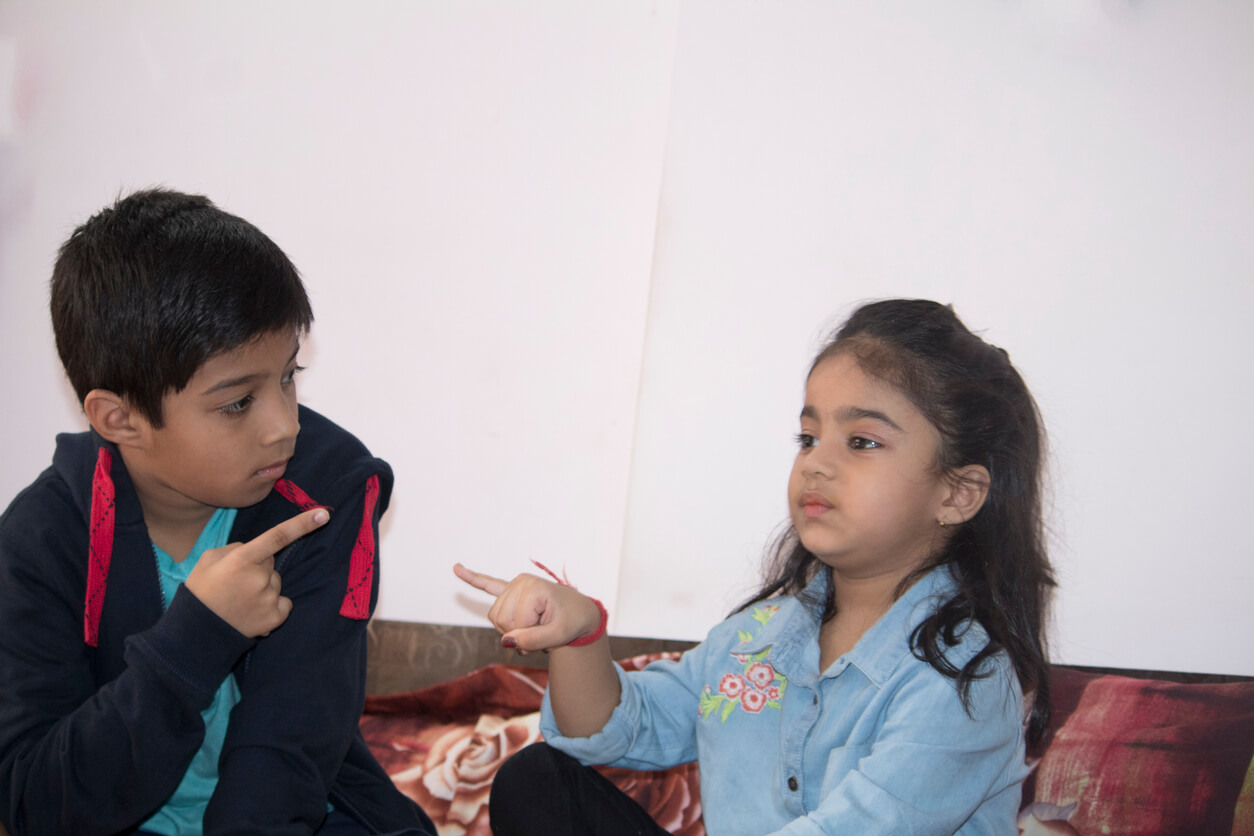Why Do Children Tattle on Each Other?


Written and verified by the psychologist Mara Amor López
Why do children tattle on each other? This is a question we often ask ourselves. But, to find out, it’s important to go deeper to see if there’s something else behind these constant accusations. For example, there are children who tell on others in order to get attention and others who do it as a way to compete with other children or with siblings. Therefore, it’s important to look into the “why” of this behavior.
A child who tattles excessively may have problems in their social development. This action may hide a desire to place themselves above others, especially in front of adults. Also, it can be produced because they feel obliged to denounce those rules that haven’t been complied with, to gain the favor of their elders, or simply as a way to please their parents. In this article, we’ll tell you all about it.
Learn why children tattle on each other
When a child tattles on another child because they do something against the established rules or norms, it can be for several reasons:
- They want to get attention, regardless of what happens.
- They want to please adults and gain their favor in front of others.
- They want to show that they’ve learned the rules they’ve been taught very well.
- They feel an obligation to denounce things that go against the established rules.
By the time they’re four years old, in their minds, children already have concepts such as honest, reasonable, good, or bad. That’s why, when someone doesn’t behave in a desirable way, the child accuses them as a way of differentiating what’s right from what’s wrong. Now, tattling has arrived on the scene to replace the fights that used to be frequent.
Another thing is for a child to tattle on someone else’s wrongdoing. This can give them a sense of self-esteem because they feel that they can be trusted. Of course, we shouldn’t encourage the accuser’s action either. It’s important that we teach them that no one is perfect and that we can all improve. Also, that surely they, on some occasions, have done things that weren’t right. We must avoid taking exaggerated positions that encourage these attitudes.

What strategies to use when children tattle on each other?
If a child tattles on you and gets your attention, they’ve succeeded. Therefore, they’ll keep up this attitude, as they consider it a positive thing. However, if a child informs you about a dangerous situation without any intention of tattling, we should reward this action.
On the other hand, when what has happened is a situation that has no real significance, what we have to do is, precisely, remove its relevance. In this way, the child who tattles will lose interest, as this attitude of accusing doesn’t provide them with the benefits they were looking for.
We have to make the child who tattles see that we’ll deal with what they tell us later on. A very important thing we shouldn’t do is to scold the child who has disobeyed or whose been accused in front of the accuser. If we have to tell them something, we’ll tell them later, without the presence of the child who did the tattling.
Evaluate the situation
We must help the child to differentiate what’s really dangerous from what’s just gossip. It’s one thing to tattle because their little brother is climbing a tree and could fall, and it’s another to say that they haven’t properly put away their toys. Although it’s difficult to teach this difference to young children, we must help them to achieve it.
In addition, we must make it clear to them that it’s not necessary to tell us everything that happens in their environment. However, we must give them the confidence to ask for help whenever they need it.
Promote children’s autonomy
We don’t always have to listen to children’s accusations, especially when there’s no danger or when it’s a conflict between them. If we take the side of one or the other, we’ll encourage competitiveness. In this regard, we have to let them be the ones to solve those small conflicts or problems with others. In this way, they’ll be able to face these situations through negotiation, collaboration, and in the framework of respect.
Adults will always be attentive to ensure that there’s no situation of disrespect between them or that they end up hurting each other. This is a way of letting them grow up and become independent children. However, we can always help them to find tools and resources to cope with difficult situations.

Redirect situations in a positive and adult way
To do so, we must start with ourselves and our behaviors. For example, we shouldn’t make derogatory comments about others in the presence of children.
Why children tattle on others
As you’ve seen, there can be many reasons why children tell on others. Knowing why they do it is a good way to start managing this situation. Here we’ve given you some strategies that you can apply to prevent children from getting angry and accusing others of unimportant things. We must make it clear to them that, if someone’s in danger, they should let us know, but about things that aren’t that important.
One way to work on this behavior is to ask them to tell us only good things about others. This way, they’ll also see the positive side of other people. We mustn’t forget that they’re children and that we, the parents, must direct these behaviors so that they don’t become a problem for their social development.
Why do children tattle on each other? This is a question we often ask ourselves. But, to find out, it’s important to go deeper to see if there’s something else behind these constant accusations. For example, there are children who tell on others in order to get attention and others who do it as a way to compete with other children or with siblings. Therefore, it’s important to look into the “why” of this behavior.
A child who tattles excessively may have problems in their social development. This action may hide a desire to place themselves above others, especially in front of adults. Also, it can be produced because they feel obliged to denounce those rules that haven’t been complied with, to gain the favor of their elders, or simply as a way to please their parents. In this article, we’ll tell you all about it.
Learn why children tattle on each other
When a child tattles on another child because they do something against the established rules or norms, it can be for several reasons:
- They want to get attention, regardless of what happens.
- They want to please adults and gain their favor in front of others.
- They want to show that they’ve learned the rules they’ve been taught very well.
- They feel an obligation to denounce things that go against the established rules.
By the time they’re four years old, in their minds, children already have concepts such as honest, reasonable, good, or bad. That’s why, when someone doesn’t behave in a desirable way, the child accuses them as a way of differentiating what’s right from what’s wrong. Now, tattling has arrived on the scene to replace the fights that used to be frequent.
Another thing is for a child to tattle on someone else’s wrongdoing. This can give them a sense of self-esteem because they feel that they can be trusted. Of course, we shouldn’t encourage the accuser’s action either. It’s important that we teach them that no one is perfect and that we can all improve. Also, that surely they, on some occasions, have done things that weren’t right. We must avoid taking exaggerated positions that encourage these attitudes.

What strategies to use when children tattle on each other?
If a child tattles on you and gets your attention, they’ve succeeded. Therefore, they’ll keep up this attitude, as they consider it a positive thing. However, if a child informs you about a dangerous situation without any intention of tattling, we should reward this action.
On the other hand, when what has happened is a situation that has no real significance, what we have to do is, precisely, remove its relevance. In this way, the child who tattles will lose interest, as this attitude of accusing doesn’t provide them with the benefits they were looking for.
We have to make the child who tattles see that we’ll deal with what they tell us later on. A very important thing we shouldn’t do is to scold the child who has disobeyed or whose been accused in front of the accuser. If we have to tell them something, we’ll tell them later, without the presence of the child who did the tattling.
Evaluate the situation
We must help the child to differentiate what’s really dangerous from what’s just gossip. It’s one thing to tattle because their little brother is climbing a tree and could fall, and it’s another to say that they haven’t properly put away their toys. Although it’s difficult to teach this difference to young children, we must help them to achieve it.
In addition, we must make it clear to them that it’s not necessary to tell us everything that happens in their environment. However, we must give them the confidence to ask for help whenever they need it.
Promote children’s autonomy
We don’t always have to listen to children’s accusations, especially when there’s no danger or when it’s a conflict between them. If we take the side of one or the other, we’ll encourage competitiveness. In this regard, we have to let them be the ones to solve those small conflicts or problems with others. In this way, they’ll be able to face these situations through negotiation, collaboration, and in the framework of respect.
Adults will always be attentive to ensure that there’s no situation of disrespect between them or that they end up hurting each other. This is a way of letting them grow up and become independent children. However, we can always help them to find tools and resources to cope with difficult situations.

Redirect situations in a positive and adult way
To do so, we must start with ourselves and our behaviors. For example, we shouldn’t make derogatory comments about others in the presence of children.
Why children tattle on others
As you’ve seen, there can be many reasons why children tell on others. Knowing why they do it is a good way to start managing this situation. Here we’ve given you some strategies that you can apply to prevent children from getting angry and accusing others of unimportant things. We must make it clear to them that, if someone’s in danger, they should let us know, but about things that aren’t that important.
One way to work on this behavior is to ask them to tell us only good things about others. This way, they’ll also see the positive side of other people. We mustn’t forget that they’re children and that we, the parents, must direct these behaviors so that they don’t become a problem for their social development.
All cited sources were thoroughly reviewed by our team to ensure their quality, reliability, currency, and validity. The bibliography of this article was considered reliable and of academic or scientific accuracy.
- Hidalgo-Rípodas, L. (2016). Previniendo el acoso escolar desde la etapa de Educación Infantil (Bachelor’s thesis).
- Suckling, A. (2006). Herramientas contra el acoso escolar: un enfoque integral. Ediciones Morata.
This text is provided for informational purposes only and does not replace consultation with a professional. If in doubt, consult your specialist.








